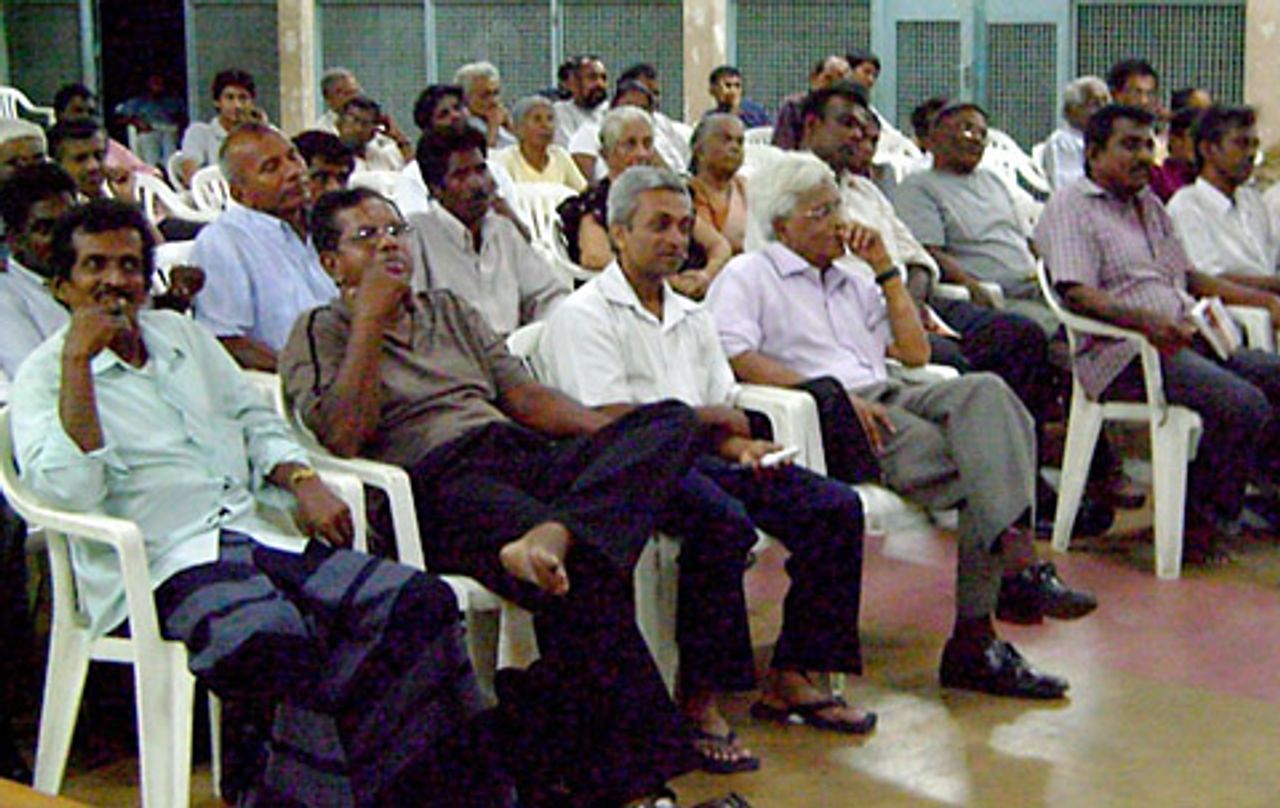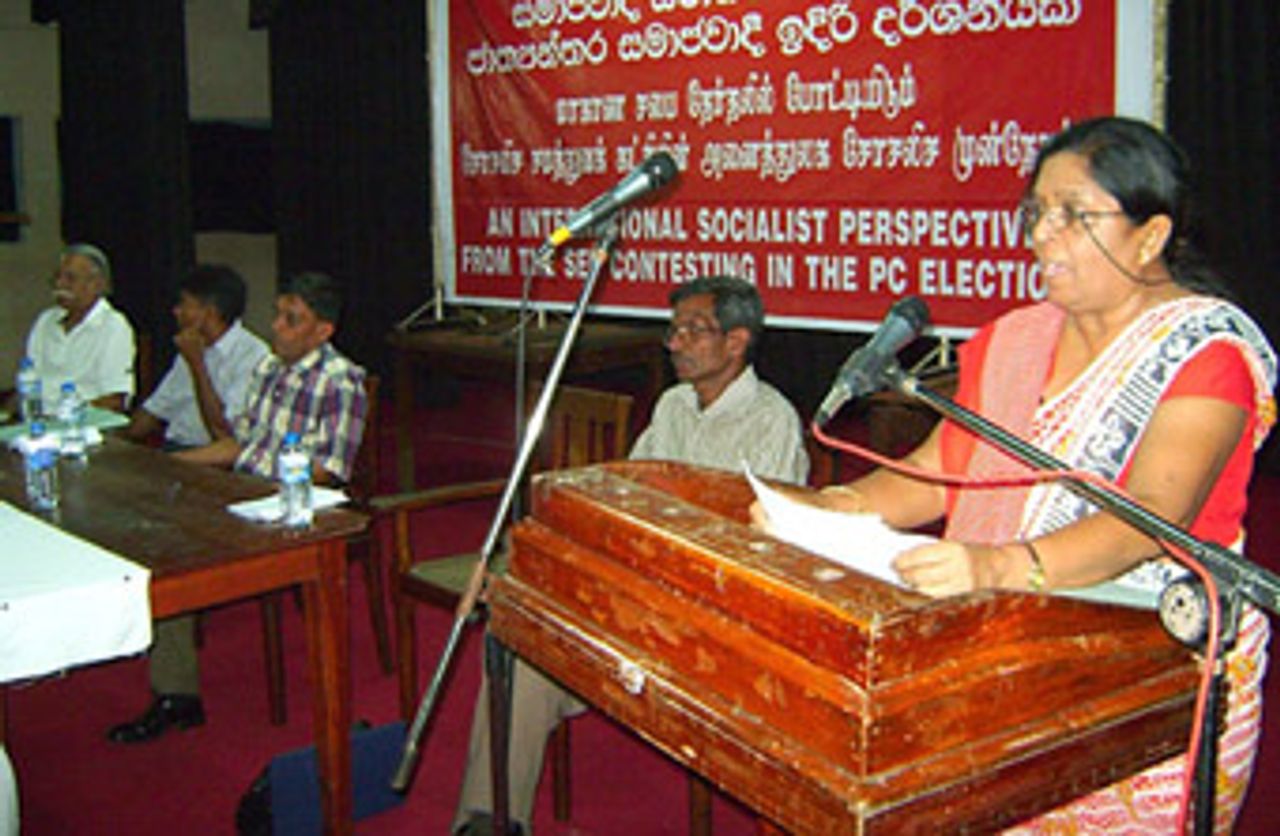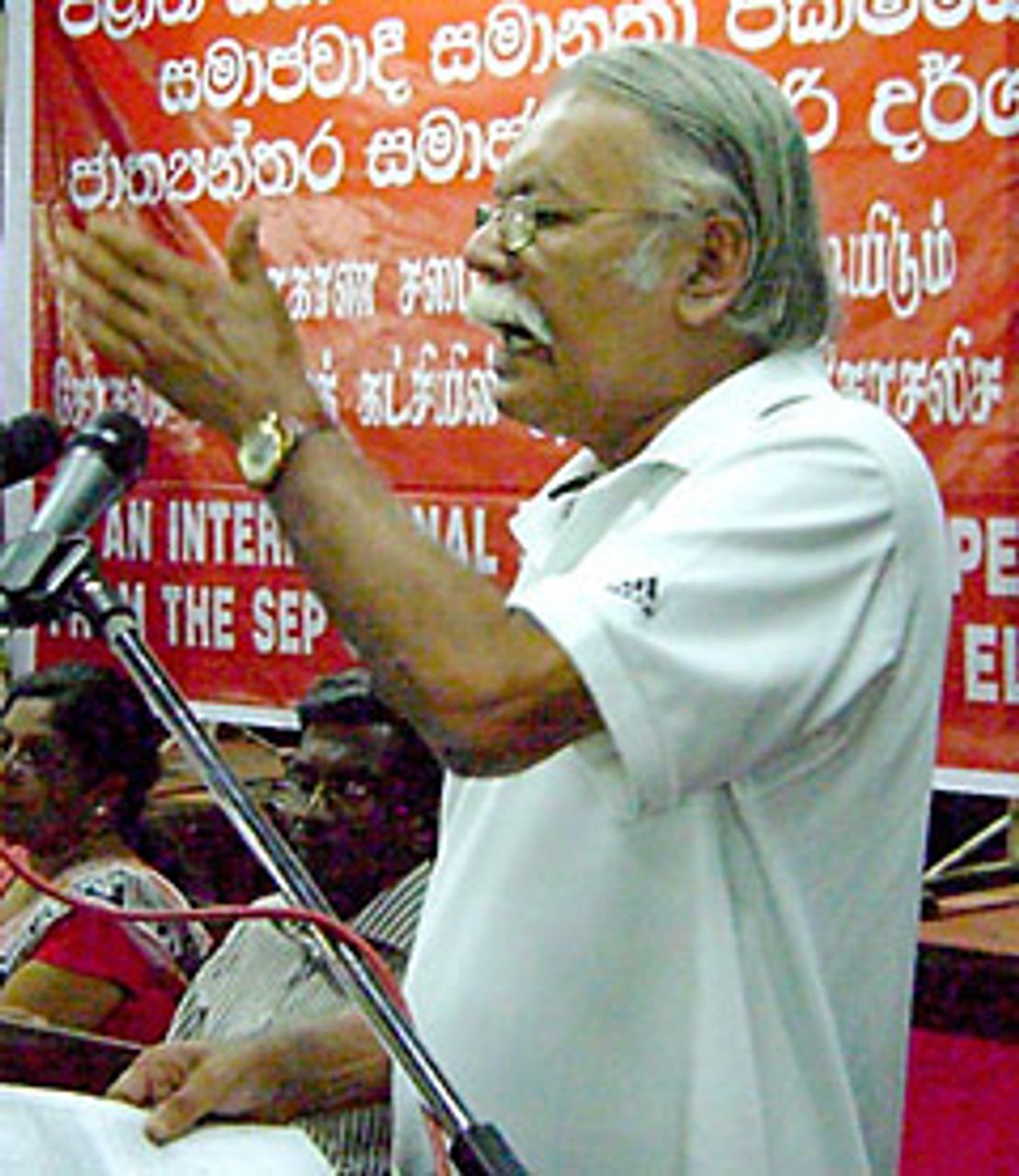The Socialist Equality Party (SEP) in Sri Lanka held its first public meeting on March 24, as part of the party's campaign for the Colombo district in the Western Provincial Council election on April 25. The SEP is fielding a list of 46 candidates, headed by political committee member Vilani Peiris.
Before the meeting, SEP teams campaigned in and around central Colombo, including in Jayawadanagama, the Ratmalana railway workers quarters, Kotahena and Colombo University. About 75 workers, young people and housewives attended the meeting at the Colombo Public Library Auditorium
SEP political committee member W.A. Sunil, who chaired the meeting, explained: "As in the previous provincial council elections in March, the SEP is contesting the Colombo district to advocate a socialist internationalist perspective against capitalism as a part of our political struggle to mobilise workers, youths and intellectuals. We aim to open up a deep-going discussion on the serious issues confronting working people."
 Part of the audience
Part of the audience
Sunil warned that police-state measures against Tamils were being extended to working people as a whole. He cited the comments of Defence Secretary Gotabhaya Rajapakse in the New York Times describing terrorism as a cancer that would require "radiation treatment" even after the separatist Liberation Tigers of Tamil Eelam (LTTE) were defeated.
"This means that after the war against the LTTE is ended, the Rajapakse government is going to transform the whole country into a military camp and escalate attacks on the working class and oppressed masses," Sunil said. "The huge burdens imposed by military expenditure and the impact of the world crisis will provoke struggles by workers and youth. The government is preparing to crush them. A socialist movement of workers must be built to end the war and fight against the attacks on living conditions and democratic rights."
Leading SEP candidate Vilani Peiris delivered the main speech. International Students for Social Equality (ISSE) convener Kapila Fernando and SEP political committee member M. Thevarajah also addressed meeting. SEP general secretary Wije Dias made some concluding remarks.
Peiris began by asking: "What has the Sri Lankan ruling elite, which has been celebrating the 61st anniversary of so-called independence, got to offer to working people? It is war, poverty and misery and systematic attacks on democratic rights. The 26-year civil war has developed into a brutal genocidal one. This is the central issue in the Sri Lankan political situation that people should pay attention to in this provincial election. "
 Vilani Peiris addressing the meeting
Vilani Peiris addressing the meeting
Peiris referred to a recent UN report cited in the Guardian, which reported that in the war zone, "about 150,000 people are trapped facing a near-death situation without water, food, medicine, shelter and other facilities. An all-out humanitarian catastrophe is about to happen. About 60 civilians are killed every day by indiscriminate shelling and bombing carried out by the military."
Drawing on experiences in the SEP campaign, Peiris pointed out that a majority of people are not happy about the war. "The SEP calls for the immediate and unconditional withdrawal of all troops from the north and east of the island to unite Sinhala, Tamil and Muslim workers to end the war and fight for a workers' and peasants' government—the Socialist Republic of Sri Lanka and Eelam as part of Socialist South Asia and international socialism," she explained.
Peiris referred to an article in the Hindu, which stated that President Rajapakse "called upon India, China, Pakistan, Japan and other countries that helped in the fight against terrorism to come forward and assist in reconstruction so that terrorism would not be able to raise its head again". She explained: "Fearing the developing opposition of the working class and oppressed, Rajapakse is appealing for assistance from the world powers. He is going to open the north and east for imperialist investors."
The speaker drew attention to moves by the US and European states to discuss the Sri Lankan war in the UN Security Council, against the opposition of Russia and China. "The US is concerned that the island's civil war will destabilise the South Asian region, particularly India, undermining its plans to use India as a counterweight against China." All the major powers were attempting to use the war to enhance their influence in the region.
Peiris traced the historical roots of the war to the creation of state structures in South Asia in 1947-48 by the British colonial rulers. With the help of the national bourgeoisie, Britain partitioned the subcontinent into a Muslim Pakistan and a Hindu-dominated India, while setting up Ceylon as a separate state and a base for continuing British operations in the region. Only the Trotskyist Bolshevik Leninist Party of India (BLPI) opposed these arrangements between imperialism and the national bourgeoisie.
 Wije Dias
Wije DiasIn his remarks, Wije Dias said: "When human society faces a deep crisis it is forced to turn to history. Deep historical issues, which lie beneath the surface in normal times, always come out in a period of crisis. The theoretical weapons to deal with these historical issues are possessed only by the revolutionary movement in its protracted fight for the principles of Marxism—that is, scientific socialism. The SEP and our world party, the International Committee of the Fourth International, is the only movement that embodies the experience and theoretical issues that have been fought out in the class struggle in different areas of the world since the mid-nineteenth century."
Dias contrasted the approach of the SEP to clarify historical issues with the gross distortion of history by the opportunist Nava Sama Samaja Party (NSSP) to suit its political purposes. He cited the comments of NSSP leader Karunaratne, who joined United National Party (UNP) leader Ranil Wickremesinghe to celebrate 61 years of independence. "As the present day leader of the Samasamajist movement, which made a special contribution to the independence struggle, I have neither shame nor fear to step on this stage to speak on freedom," Karunaratne declared.
Dias commented: "What an insult! In the name of the NSSP, he is speaking on the platform of the UNP leaders who worked to set up the trap of so-called independence to abort the socialist revolution. As he said, he has no cause to be shamed or fear. He was with his friends there. If he can support the creation of this Sri Lankan state and share the same stage as the UNP that set up that state, then logically the NSSP is defending all the crimes of that reactionary ruling class in the subsequent for 61 years against working people, particularly the suppression of Tamils with bloody means."
Dias pointed out that Karunaratne had specifically hailed the political leaders of the ruling class, from S.W.R.D. Bandaranaike and Dudley Senanayake to J.R. Jayawardene, for their deals with Tamil bourgeois leaders for the devolution of power. Karunaratne praised them for being guided by "principles of kindness and mercy". In fact, every one of these leaders was responsible the persecution of Tamils that led to the war which Jayawardene launched. The devolution deals were nothing more than political traps designed to cement a mutual exploitation of the working class by the Sinhala and Tamil elites.
The WSWS spoke to a number of workers and youths after the meeting.
AR, a worker from the Colombo port, explained: "As a worker, I have the experience of exploitation and attacks on workers. We need a program to end this situation. I oppose this war. The government repeatedly claims the war is about to finish. But even if it finishes the war, it has no solution for the Tamil masses and working people."
Commenting on the global economic crisis, AR said: "We feel from the activities in the port that the economy is weak. The only way the government sees to solve the crisis is by borrowing. But that will not solve the crisis. If people come to the streets, it is definite that the guns now aimed to the north will be turned to the south. Always [striking] workers are labelled as ‘LTTE'. We port workers have had that experience."
SS, a young Tamil, said: "This is a good work. You have explained your perspective. We have to win more members to carry out a wide campaign. The war is to demolish the Tamils. But even the Tamil politicians are supporting the government."
SM said: "Yes, the war is the central issue in Sri Lankan society. I bow my head to your brave stand in this election. You are contesting this election against the war and the anti-democratic measures of the Rajapakse government.
"I am a long-standing reader of the WSWS and I had some kind of faith in the program and the perspectives of the SEP. However, I couldn't believe the sudden collapse of capitalism that we have seen during last few months.
"A lot of my friends, who were not interested in world matters, are now talking about the financial crisis, the Iraq war, mass layoffs, unemployment, etc. But they have different views and many think this crisis is the outcome of mismanagement."
KR, a Swedish student, said: "This meeting was a great new experience for me. When you talked of a united world at first I was a little afraid. I thought it would be like the European Union or one world under the USA. However, when you explained that it is none of those and that it will be a United Socialist Republic of the World, I thought this is a new idea and quite interesting too.
"Yes, if it is under the control of the working people of all nations, it is very striking. Only the rule of the working class can unite mankind. This meeting showed me there is a movement already all over the world."
BS, an Iraqi student, stated: "I am from Baghdad. I have had first-hand experience of the most destructive war in the world. I praise the American and European youth who opposed their own country's war against Iraq and wanted to take their armies home. I see you as their brothers.
"Every speaker in your meeting—strikingly there are young, adult and old—spoke for the same goal from different angles. Your explanation that all this came from the rotten post-Second World War peace is very striking. Similarly, in the Middle East, the Arab-Israel working class must unite for a Socialist States of the Middle East. There are so many complications in the area. It may take a long time but it seems it is the only way out."
